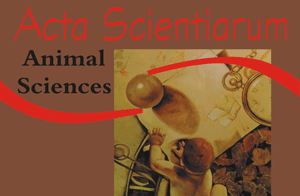ABSTRACT.
The objective was to evaluate the grazing behavior and the spatial distribution of feces of F1 young bulls from the cross between Nellore and Guzera on pastures of Urochloa brizantha cv. Marandu in silvopastoral systems composed of babassu palm (Attalea speciosa) and Marandu monoculture in the Pre-Amazon region of the state of Maranhão. Animals were evaluated in four systems consisting of 0, 80, 131, 160 palms ha-1, characterizing monoculture (mono), low density of palm trees (LD), medium density of palm trees (MD) and high density of palm trees (HD) during the rainy (RE) and dry (DE) periods. Five animals (repetitions) were used in each system, with 231-303 days of age and 180±15 kg body weight. Determinations of behavioral patterns were made by instant sampling, at 10 min intervals. In each system, we demarcated 50 squares of 100 m2, which served as useful area to evaluate the dispersion of feces. The grazing behavior was influenced by the sward structure, which, in turn, was influenced by densities of palm trees, due to shading. The distribution of feces was affected by both the presence of babassu plantations and periods. The silvopastoral systems made the environment more pleasant to animals, since activities considered more stressful and avoided during the daytime were performed by animals of these environments, unlike animals in the monoculture system.
Keywords:
babassu; sward structure; dispersal; idle; palm trees; rumination

 Thumbnail
Thumbnail
 Thumbnail
Thumbnail
 Thumbnail
Thumbnail
 Thumbnail
Thumbnail



